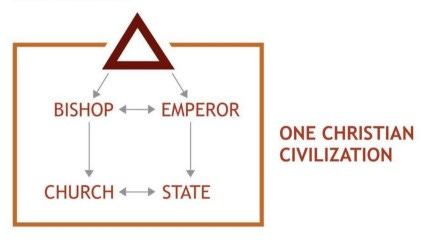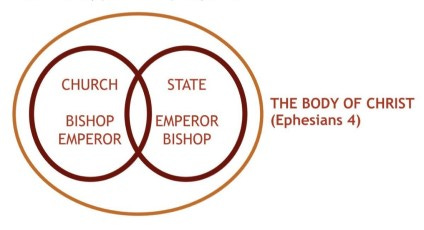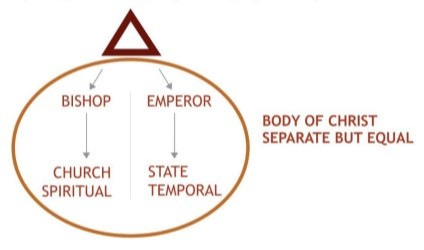Judas: The O.G. Christian Nationalist
And the Unofficial ‘Patron Saint’ for 1,700 Years of Shameful Christendom
If you enjoy this article, please click Like (❤️) to help others find my work.

“God is dead” — from Nietzsche to the New York Times, many people have pondered the idea of a powerful, all-knowing, loving God (in the Judeo-Christian belief) and its utility to followers. They’re typically asking about whether the belief still resonates within cultures, not whether any transcendent being has suddenly ceased to be alive.
For faithful Christians, the question of God’s demise takes on an extra meaning. Christianity claims that God took human form in the person of Jesus of Nazareth, who did actually die as a capital criminal nearly 2,000 years ago.
I spoke about the historical aspects of the persecution and death of Jesus with Adam Haman and Bob Murphy on their collaborative podcast shortly before the current Holy Week (or Passion Week) leading to the celebration of Jesus’ resurrection on Paschal Sunday (more commonly “Easter” in English).
You can listen at Adam’s and Bob’s channels:
Haman Nature — right here on SUBSTACK!!! … YouTube … X/Twitter
The Bob Murphy Show — Spotify … YouTube … The Bob Murphy Show website
I covered some podcast highlights in last week’s article, but saved the liveliest portion for this week’s post.
This hottest of hot takes by me was that there’s something worse than wanting “God [to be] dead” to earthly affairs. And one of Jesus’ closest companions, Judas Iscariot, showed what it is.
Judas Iscariot, the Betrayer

What do Judas and the other Apostles witness over the last few days of Jesus mortal life?
Jesus spends hours each day conversing in the Temple area, the seat of religious and civil authority in Jerusalem. The Israelite leaders are fully aware of Jesus’ presence and even send some of their members to question Him. The encounters are contentious, but neither an arrest nor any other violence against Jesus occurs.
The Gospel writers tell us, via the narrator, of the plot to kill Jesus. But to an observer in the Temple — who hasn’t been tipped off by a narrator — it looks like Jesus’ high-status opponents want to meet formally with Him, as happened on at least three earlier occasions (Luke 7:36-50; 11:37-54; 14:1-24).
Enter Judas, known to be conniving, opportunistic and drawn to the power of money (John 12:4-6), and who maintains an affinity for political authority. He willingly approaches the chief priests and elders and offers to bring Jesus to them.
Judas is also, in card-playing terms, an easy mark. He has no “read” at all on what cards the chief priests are holding, and he wildly overplays his own hand.
In the podcast, my description prompted Bob to compare Judas to Fredo Corleone from The Godfather and The Godfather II movies. Fredo, ignorant but full of ambition, nearly got his brother Michael killed while trying to broker a deal with a rival faction.

Anti-Christ is worse than Contra-Christ
Those who express a desire to kill Jesus aren’t typically described as betraying Him. On the other hand, Judas’ reaction to Jesus’ persecution is that he “deeply regretted what he had done” (Matthew 27:3). That doesn’t seem like the response of someone who wanted Jesus dead.
So, why call Judas, the Betrayer? Judas seeks something worse than to kill Jesus. Judas wants to change Jesus to be supportive of something inherently, intrinsically evil: the coercive civil authority (a.k.a. “government”).
Judas is essentially the O.G., the “Original Gangster,” the forerunner, the prototype of the contemporary Christian Nationalist. He’s the unofficial “patron saint” for Christendom, the term for the longstanding, imposed, political domination by nominal Christians in Europe and European-influenced territories.
The problem for Judas and subsequent government loyalists is that there are zero examples in the canonical Gospels of Jesus modeling or preaching coercion as a means of fulfilling the responsibilities of discipleship. On the other hand, there are plentiful instances of Jesus countering coercive tactics, especially as found at institutional levels (I address many in my book).
So, those who cling to the government model have basically two options regarding Jesus:
Reject Jesus — be Contra-Christ — as the persecutors do.
Try to modify Jesus to justify government — be Anti-Christ — as the Betrayer seeks to do.
For nearly 300 years, the Early Church overwhelmingly held true to Jesus’ dignified defiance and undermining of coercive civil authority.
Then in the 4th Century, the wily Roman Emperor Constantine and his supporters in the Church hierarchy joined forces to distort the Gospel message and promote coercive civil authority as divinely favored. Professor Maxie Burch uses graphics to show three popular, pro-government, Anti-Christ frameworks that emerged in this period (c.f. “Early Christian History” course workbook, pages 14-16):
Eusebius of Caesarea’s “Cultural Model,” where the Roman emperor is God’s vice-regent alongside bishops.
—
Ambrose of Milan’s allegedly “Biblical Model,” where the Church and State overlap and are subservient to one another depending on the issue.
—
Hosios of Cordova’s “Doctrine of the Two Swords,” where Church and State are each ordained by God in adjacent autonomous domains.
—
Three centuries after Judas’ offer to hand over Jesus, the unholy union happened.
Miraculously, this 1,700-year, Judas-like illness hasn’t been totally fatal to genuine Christian social morality. Though a minority today, some anarchist/voluntarist good neighbors (and bad citizens!) do exist, as have persisted in every age since Jesus’ tumultuous time.
Yes, even in the dissonance preceding Paschal Sunday, the evergreen harmony of grace still beckons. It’s why the week is called Holy. It’s why the Friday is called Good.
Despite the desires of some extremely corrupted souls, God doesn’t stay dead.
Now, each of us must decide in our own lives whether God remains betrayed.
May more people choose Jesus’ Gospel instead of Judas’ Government.
You, the Commenter
What did you think of the crossover podcast? How about my two-article explanation of the main points?
Does any of this information disrupt your previously held beliefs about Judas and his actions?
Was I fair, too lenient, or too harsh in analyzing Judas’ actions? How about Judas’ descendants in Christendom/Christian Nationalism?
Is God dead?
Let me know your thoughts below …
—
My book, Good Neighbor, Bad Citizen, is available at:
· Amazon (paperback & Kindle)
· Barnes&Noble (paperback)
· Lulu (paperback)
Find me on X: GoodNeighBadCit
And, as always: Be a good neighbor, even if it makes you a bad citizen.







